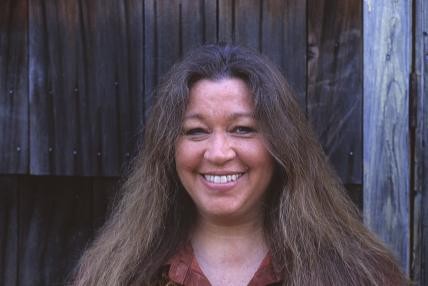 |

 |
 |

 |

March 29, 2002 Halifax Herald Martin: pursuing her film making dream ON MARCH 8, 1958, while residing in Pompano Beach, Fla., Ben and Jean (Johnson) Martin welcomed Cathy, the third of their eight children, three boys and five girls. Her birth in this subtropical land resulted from Ben leaving Nova Scotia in 1949 - during the mass exodus of Maritime Mi'kmaqs to Boston and other faraway places - in search of a better life. After working for a few years in Beantown, Ben joined the United States Marines and was based in Florida by 1958. The family returned to their Nova Scotia roots in 1973.
At that time, Cathy's top priority - amidst acclimatizing to a new lifestyle in the country of her roots, with the goal of a career in communications at the forefront - was to acquire a quality education. Her dedicated resolve was rewarded in 1979, when she graduated from Dalhousie University with a bachelor of arts degree, with majors in drama and theatre arts. Not satisfied with this, she later returned to school, graduating in 1998 from Mount Saint Vincent University with a master of education degree.
During 1981, Cathy began a two-and-a-half-year stint with Parks Canada, and was posted for training purposes in several locations across the country. The position was among several successive jobs that kept her occupied while trying to open the door to becoming a film-producing storyteller.
Cathy's luck changed in 1985; she finally got the opportunity to get involved in what she describes as the love of her work life, film making. With the completion of the six-minute documentary entitled Minqon Minqon, a profile of Maliseet artist and feminist Shirley Bear - in collaboration with Kimberlee McTaggart - she became Nova Scotia's first Mi'kmaq filmmaker.
Minqon was one of 16 short films that appeared in Five Feminist Minutes, a nationwide collection of work by young women filmmakers. It received a Moonsnail Award for best short documentary at the 1990 Atlantic Film Festival, and has been shown around the world at film and video festivals.
Her next effort was also in collaboration with Kimberlee. They co-directed KWA!NU!TE: "Mi'kmaq and Maliseet Artists" for NFB's Atlantic Centre. The film, which won an Award for Excellence at the 1991 Atlantic Film Festival, was aired on CBC TV in May 1992. In 1993, adding to the lustre, it was the winner of a Silver Apple Award, Visual Arts category: "Profiles of Artists," at the National Educational Film and Video Festival, Oakland, Calif. It also received honourable mention in the category of Fine Arts: "The Artists," at the 35th American Film and Video Festival, Chicago, Ill., in 1993.
It seems that a "Why not keep a good thing going?" attitude now came into play. After completion of KWA!NU!TE, Martin and McTaggart collaborated on the independent production of Initiations, a short drama with an anti-drug and alcohol message for native youth. During this period, they formed a production company, Matues Productions ( Mi'kmaw for "porcupine"). Cathy then directed Mi'kmaq Family/Migmaoei Otjiosog for the NFB's Atlantic Centre. The film grew out of a search for Mi'kmaq family values, which took on a new meaning for her after her second child was born.
The effort was rewarded with the Andris Slapinsh Memorial Prize for Best Indigenous Film at the 9th International Visual Anthropological Festival, Parnu, Estonia, in 1995. It was also accepted by the Palm Springs International Short Film Festival for consideration in August 1995, and the National Museum of the American Indian Film and Video Festival in New York in September '95. On May 18, 1996, it received the Silver Apple Award at the National Educational Film and Video Festival, Oakland, Calif. It has been aired on CBC, CTV, Ontario Vision TV and APTN (Aboriginal Peoples TV). For Mi'kmaq Family, Martin received a Certificate of Honour for High Standards of Excellence from the American Indian Film Festival, San Francisco, Calif.
Several other projects have since been completed, including this gem. It's a documentary for Vision TV called SPIRIT WIND. It details the efforts of a Mi'kmaw chief and his crew of warriors who built a birch bark canoe and paddled it from Conne River, Nfld., to Nova Scotia, as part of a vision that the chief had towards healing and strengthening of their community. It took three years and three attempts before the crossing and journey was completed. Martin not only produced, directed and wrote the project, but she did the shooting as well. After it was screened in Washington, D.C., it was nominated for and received, in October 2000, the Andres Slapinsh Award - an international award from the Smithsonian Institution. It's awarded annually to the best native northern filmmaker; it was the second time Cathy won it.
Martin's works in progress include The Final Journey, a video about a Listuguj, Que. (Restigouche), Mi'kmaw's final struggle with HIV/AIDS; and Seven Days of Healing and Mourning, about the suicide healing and prevention crisis in Big Cove in 1993. She is also shooting a documentary with the National Film Board about the life of Annie Mae Aquash, a Mi'kmaw woman from Nova Scotia who became actively involved with the American Indian Movement in the mid-1970s. Aquash was shot and killed, execution style, in South Dakota in 1975; 27 years later, her murder has yet to be solved.
In addition to her film work, Cathy is employed by the Confederacy of Mainland Micmacs as university education counsellor. However, her fondest dream of becoming a full-time filmmaker and storyteller some day has not dimmed.
She resides with her husband, Frank Clifford, and their children, Natalie and Thomas, in Blind Bay, N.S.
Keep up the great work, Cathy. We're proud of you. May the Great Spirit be with you and help you realize your dream!
Daniel N. Paul
DANIEL N. PAUL